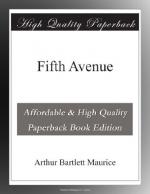Dessert.
Delicieux aux noisettes. Biscuit
Tortoni.
Fruit glaces.
Petit fours. Bonbons.
Pieces montes.
The musty inn of mid-Europe will boast till the end of time of the two-hour visit within its walls of a certain Elector and his suite in the year sixteen hundred and something or seventeen hundred and something. There is not a hostelry in England dating back to Tudor times without a bed in which Queen Elizabeth is reputed to have slept. But for famous guests, authentically established, there is probably no other hotel in the world that is to be compared to the Fifth Avenue. When the boyish Prince of Wales played leap-frog in its corridors at the time of his visit to the United States in 1860, he began a distinguished procession. Every president of the nation from the day the hotel was opened until it closed at some time stayed there. That meant Lincoln, Johnson, Grant, Hayes, Garfield, Arthur, Cleveland, McKinley, and Roosevelt. At the time of Grant’s funeral in August, 1885, the immediate family, the relatives, President Cleveland, Vice-President Hendricks, former Presidents Hayes and Arthur, the members of the Senate, the House of Representatives, and the Supreme Court, the Diplomatic Corps, and the Governors of the various States were all guests of the hotel. Not only did great men stay there, but they did things there. It was at the Peabody dinner at the Fifth Avenue that the movement to nominate Grant for President started. In 1880, after his nomination, Garfield, at the solicitation of Arthur, came all the way from Mentor to meet Roscoe Conkling. But the haughty and powerful Conkling would not see him. If the hotel had not been the recognized shelter of visiting Republican statesmen in New York it is reasonably certain that Tilden, instead of Hayes, would have occupied the White House from 1877 to 1881, for it was there that a rescue of the Republican candidate was set on foot in 1876 after he had been given up as lost. In one of the parlours of the hotel the ill-advised Dr. S.A. Burchard doomed Blaine to defeat when he said: “We are Republicans, and we do not intend to leave our party to identify ourselves with a party whose antecedents have been Rum, Romanism, and Rebellion.”
Today it would be hard to find a hotel below Forty-second Street that still continues on what is known as the American plan. But when the Fifth Avenue was young that system of prices was supposed to embody the national spirit of democracy. Yet the idea had its wise critics, who found in it a certain injustice. For example there was an editorial on the subject, apropos of the Fifth Avenue, in the issue of October 1, 1859, soon after the hotel was opened, which ran, in part: “In the first place, what can be more preposterous than to establish a fixed rate of fare at hotels? Big, fat, bloated, blustering Guzzle goes to the Astor House for a week, and, in virtue of his standing and his paunch, gets a room




